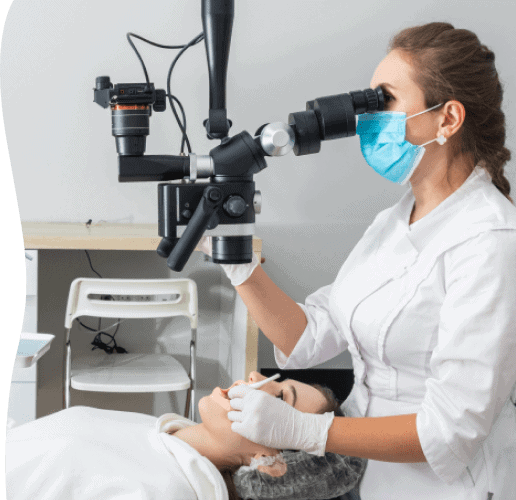Invisalign is a popular orthodontic treatment using a series of clear, removable aligners. It is a teeth straightening procedure for patients with mild to moderately misaligned teeth. It also addresses crowded or crooked teeth, bite issues, and gaps in their teeth. As the aligners are made from medical-grade plastic, many people wonder if it’s possible and safe to sleep with them overnight.
The answer is yes — wearing your aligners during sleep is safe. Read on to find out more.

Summary of the Article
Wearing Invisalign aligners while sleeping is highly recommended as it helps to ensure that you achieve your desired results in the timeline of your treatment plan. However, it is important to take certain precautions when sleeping with your aligners to ensure they are effective and avoid potential damage to your teeth or the aligners themselves.
Not wearing your aligners at night can negatively affect your treatment, including delaying progress, prolonging treatment time, causing discomfort, and potentially leading to poor results. If you have a history of teeth grinding at night, speak with your dentist about taking additional measures to protect your teeth while wearing Invisalign.
Should I Wear Invisalign While Sleeping?
You should wear your Invisalign aligners for at least 22 hours a day for two weeks. Then move on to the next set of aligner trays until you complete the teeth straightening process according to your custom treatment plan. As such, wearing them overnight and while sleeping is highly recommended. Wearing your aligners for extended periods will help you achieve your desired results. Note that it takes time for the aligners to move teeth and for significant changes to be visible. Not wearing the aligners for the required time can slow down and delay your treatment.
How Should I Wear Invisalign While Sleeping?
When it comes to sleeping with Invisalign, there are a few precautions and measures you should take, including:
- Sleep with the head raised and looking upward.
You may experience excess drooling and salivation for the first few nights because you are not used to the aligners in your mouth. This can eventually lead to a dry mouth. To prevent this, elevate your head and try to sleep looking upward. Also, consider having a glass of water by your bedside to help you stay hydrated. - Don’t chew on or play with the aligners in your sleep.
Some people may subconsciously play with the aligners in their mouths or chew on them while asleep. Talk to your dentist about adjusting the aligners if you find yourself doing these. - Clean and rinse your aligners before and after sleeping.
Before sleeping, rinse your aligners with lukewarm water to remove any accumulated plaque and food particles during the day. When you wake up, remove your aligners and rinse them before putting them back in your mouth. When cleaning, use a soft toothbrush with mild soap and water to remove debris or residue, then rinse them with lukewarm water. Never use hot water, as it can warp and damage the aligners.
Get Outstanding Dental Care with Us Today
At The Smile Space, we believe that comprehensive dental care should be accessible to everyone. Our experienced team is dedicated to providing the highest standard of care, using the latest technology and techniques. If you're looking for a dentist in Sutherland, book an appointment at The Smile Space today!

What Are the Effects of Not Wearing Invisalign at Night?
Not wearing Invisalign at night can have adverse effects on your teeth:
- Delayed treatment:
Not wearing your aligners at night can slow your treatment progress. As mentioned, you should wear them for 20-22 hours per day to achieve your desired results within the timeline of your treatment plan. - Pain and discomfort:
If you skip wearing your Invisalign at night, your teeth may shift back into their original positions, causing pain and discomfort when you put your aligners back in. - Longer treatment time:
Not wearing your Invisalign aligners for the recommended time can prolong your treatment, as your teeth may not move as quickly and effectively. - Poor results:
If you consistently fail to wear your Invisalign aligners at night, you may not achieve the desired results from your treatment.
Can I Sleep With Invisalign if I Have a History of Grinding My Teeth at Night?
If you have a history of grinding your teeth at night, you can still wear your Invisalign while sleeping. The aligners are designed to act as a barrier between your teeth and the excessive force produced by grinding, minimising the likelihood of damage. However, depending on the severity of nighttime clenching or grinding, your trays may break over time, requiring replacement.
Discuss your bruxism with your dentist so they can advise you on how to proceed while using Invisalign and other treatments they recommend. Taking proper precautions increases the chances of successful treatment and desired results without any concerns of potential damage overnight.
Final Thoughts
Invisalign is an orthodontic treatment that aims to straighten your teeth and help you achieve a beautiful smile. Invisalign trays must be worn for 20-22 hours per day, including at night when sleeping. Not wearing them at night can slow down and delay the treatment. If you suffer from bruxism, inform your dentist so they can modify your treatment based on your needs.
At The Smile Space, we offer Invisalign services to help you get a straighter smile. We have a modern facility and dentists with years of experience performing Invisalign treatment. If you are considering this treatment option but still have additional questions, set a dental appointment with our dentist, and we will discuss how Invisalign treatment can benefit you.
Frequently Asked Questions
Is Invisalign treatment covered by health funds?
Can I continue playing sports or musical instruments while
undergoing Invisalign treatment?
You can continue your usual activities while wearing Invisalign as long as you take the necessary precautions. When playing sports that need physical contact, you may need to remove the aligners to avoid damage and wear a mouth guard. This is to protect your teeth from unwanted harm.
When playing musical instruments like saxophone, remove them as well because the aligners may impede your breathing. But you must remember to put them back on to complete the required minimum hours of wearing the Invisalign trays.
Can I whiten my teeth while undergoing Invisalign treatment?
You can whiten your teeth while undergoing Invisalign treatment. However, it is advisable to wait until you’ve completed the treatment. Because your teeth constantly move, some parts may not be exposed to the whitening product or get lightened. This can lead to uneven whitening. If you must do it, consult your dentist before considering any teeth-whitening procedure so they can guide you on doing it safely and efficiently.







